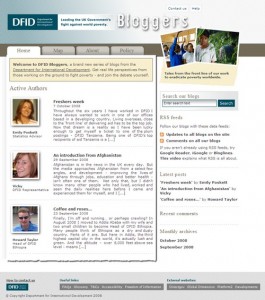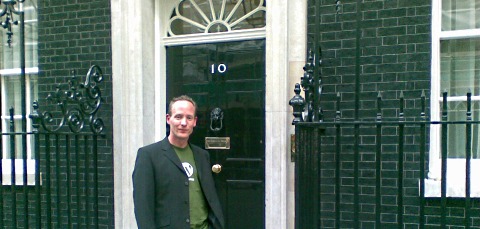 The latest Puffbox project gets a soft launch today, ahead of a formal (and hopefully high-profile) announcement next week. DFID Bloggers is a satellite site off the main Department for International Development website, and follows in the FCO’s footsteps of giving front-line staff a blog on which to talk about their work and experiences.
The latest Puffbox project gets a soft launch today, ahead of a formal (and hopefully high-profile) announcement next week. DFID Bloggers is a satellite site off the main Department for International Development website, and follows in the FCO’s footsteps of giving front-line staff a blog on which to talk about their work and experiences.
In some respects, it was an obvious thing for DFID to do. Their work isn’t generally seen by the UK taxpayers who fund it. By definition, they operate in exotic and/or difficult locations, and have powerful stories to tell. They saw the value in putting some human faces on it all; and in opening lines of communication with anyone worldwide with something to contribute. The Foreign Office had already set a helpful precedent: my brief was effectively ‘can we have what they’ve got, please?’
Using WordPress was, of course, a given; but perhaps surprisingly, I took the decision early on to use the standard version, rather than MU (Multi User). Everyone is effectively writing to the same ‘group blog’, allowing us to aggregate and consolidate the presentation (eg on the homepage, and in the main RSS feed). But the WordPress approach to output templates allows us to give each blogger a personal homepage, with a fuller biography, a filtered RSS feed and an archive of posts. The best of both worlds, if you like – with fewer concerns about the speed of updates and the compatibility of plugins.
All the standard blog functionality is in there, plus a few things you won’t have seen. The homepage shows the latest post for each ‘active’ blogger; when they haven’t written something for a fixed number of days, they’ll automatically drop down into an ‘archive’ list. There’s some customisation of the standard WordPress user profile, adding a new ‘job title’ (ie short biography) field, and incorporating Google Map functionality, for the bloggers to pinpoint their location. This geo-data gets aggregated into a Bloggers Map page, with the popup ‘speech bubbles’ showing a summary user profile, including a link to their latest blog entry.
I can’t say how pleased I am with the results. I’ve been collaborating with a couple of new contacts – my near-neighbour Tony Parsons on the design side, and Simon Wheatley (who I met at WordCamp) on the technical stuff that was beyond me. Both have been truly brilliant. And I have to say, the DFID guys have been fabulous too – giving me all the freedom I could ask for. It’s been a perfect combination, and I think it shows in the site.
In the spirit of open source, Simon W has released the custom WordPress plugins to the world via wordpress.org. In reality, you’ll only be interested in them if you’re wanting to build a carbon-copy site; but they are now ‘out there’, and you’re welcome to them.
I’ve also been working with Shane McCracken and his Gallomanor team (including Dave Briggs and Griff Wigley), who have been tasked with training the DFID volunteers in the art of blogging. Judging by the initial posts I’ve been reading, they’ve done a great job. I’m sure they will tell their own stories in due course.
Quite honestly, I think it’s the best thing Puffbox has yet produced. Great design, great functionality on front and back end, and a client committed to doing it right. With so many great stories and pictures out there, I hope it can have a big impact.
And by the way… it’s no coincidence that the site is launching just ahead of Blog Action Day next Wednesday (15 October), when bloggers have been asked to write something about poverty and development issues.







